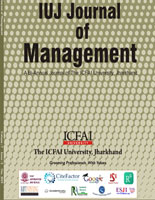Saurabh, Dr. Manisha Pallavi Chauhan
Keywords : : Financial Inclusion, bank, macroeconomic parameters, financial institutions.
EOI : eoi.citefactor.org/13.11224/IUJ.13.02.01



 The IUJ Journal of Management (IUJ-JOM) is the flagship journal of ICFAI University Jharkhand, Ranchi.
The aim of the journal is to provide insight into the business and management research. It also creates
a platform for the researchers, academicians, professors, practicing management professionals and proponents
in disseminating original,
The IUJ Journal of Management (IUJ-JOM) is the flagship journal of ICFAI University Jharkhand, Ranchi.
The aim of the journal is to provide insight into the business and management research. It also creates
a platform for the researchers, academicians, professors, practicing management professionals and proponents
in disseminating original,
theoretical and applied research in the field of management and allied disciplines. The Journal is a Bi-Annual, . . . . .Read more.
 This study examines the growing applicability of signaling theory in understanding the US higher education market’s structural challenges. Analyzing current trends through the signaling lens reveals how credential inflation, workforce misalignment, and financial unsustainability stem from education’s dual function as human capital investment and positional good.
Read more.
This study examines the growing applicability of signaling theory in understanding the US higher education market’s structural challenges. Analyzing current trends through the signaling lens reveals how credential inflation, workforce misalignment, and financial unsustainability stem from education’s dual function as human capital investment and positional good.
Read more.
 The Indian Knowledge System (IKS) represents a vast and sophisticated tapestry of intellectual traditions, pedagogical models, and ecological wisdom that has evolved over millennia. This paper undertakes a literature-based review to critically examine the conceptual, historical, and pedagogical dimensions of IKS, with a particular focus on its contemporary relevance and research potential.
Read more.
The Indian Knowledge System (IKS) represents a vast and sophisticated tapestry of intellectual traditions, pedagogical models, and ecological wisdom that has evolved over millennia. This paper undertakes a literature-based review to critically examine the conceptual, historical, and pedagogical dimensions of IKS, with a particular focus on its contemporary relevance and research potential.
Read more.
 Since the advent of management thoughts and ideas to make people work more effectively, we have indeed travelled a long way. From the early 20th century,
Read more.
Since the advent of management thoughts and ideas to make people work more effectively, we have indeed travelled a long way. From the early 20th century,
Read more.
Subscribe now to get notified about IU Jharkhand journal updates!
Saurabh, Dr. Manisha Pallavi Chauhan
Keywords : : Financial Inclusion, bank, macroeconomic parameters, financial institutions.
EOI : eoi.citefactor.org/13.11224/IUJ.13.02.01
Dr. Manish Kumar, Dr. Sweta Singh
Keywords : Women Entrepreneurship, Work-Life Balance, Digitalization, Digital Tools, Patna, Bihar, India, Entrepreneurial Ecosystem.
EOI : eoi.citefactor.org/13.11224/IUJ.13.02.02
Dr. Pallavi Kumari
Keywords : Climate Economics, Green Transitions, Emissions Trading, Climate Policy, and Sustainable Development.
EOI : eoi.citefactor.org/13.11224/IUJ.13.02.03
Shailesh Kumar, Dr. Manisha Pallavi Chauhan
Keywords : Institutional Investment, Mid-cap Firms, Corporate Governance, CEO Characteristics, Macroeconomic factors, Indian Equity Market.
EOI : eoi.citefactor.org/13.11224/IUJ.13.02.04
Dr. Pallavi Kumari, Dr. Anjan Niyogi
Keywords : Financial Management, Inventory Optimization, Accounts Receivable Management, Working Capital, Financial Ratios, Performance Metrics, Market Volatility, Technology, Sustainability, Ethical Practices.
EOI : eoi.citefactor.org/13.11224/IUJ.13.02.05
Ms. Pallawi, Dr. Pallavi Kumari
Keywords : Entrepreneurship, Women Entrepreneur, Information Technology, Digital Era, work-Life Balance.
EOI : eoi.citefactor.org/13.11224/IUJ.13.02.06
Dr. Anjan Niyogi
Keywords : workplace culture, employee engagement, organizational performance, employee retention, cultural strategies, leadership commitment.
EOI : eoi.citefactor.org/13.11224/IUJ.13.02.07
Dr. Navendu Nidhan, Professor Basant Kumar Singh and Dr. Ritika Maurya
Keywords : Bibliometric analysis; Environmental, Social, and Governance (ESG); Capital structure; Sustainable finance; Green bonds
EOI : eoi.citefactor.org/13.11224/IUJ.13.02.08
Dr Shailendra Kumar Bharal, Mr. Irfan Shafi Baba
Keywords : Traditional Knowledge, Kashmir Valley, Entrepreneurship Measurement, Indian Knowledge System, Scale Development
EOI : eoi.citefactor.org/13.11224/IUJ.13.02.09
Kinsuk Mukherjee
Keywords : Sustainable Supply Chain Management; Environmental, Social, and Governance (ESG); Sustainability in Manufacturing; B2B Manufacturing; Sustainable Innovation; Waste Reduction; Greenhouse Gas Emissions; Supply Chain Transparency; Policy Impact on Sustainability; Upstream and Downstream Supply Chains; Sustainability Performance Indicators; Circular Economy; Corporate Social Responsibility; Environmental Impact Reduction; Sustainable Business Practices; Supply Chain Resilience; Sustainability Reporting
EOI : eoi.citefactor.org/13.11224/IUJ.13.02.10
